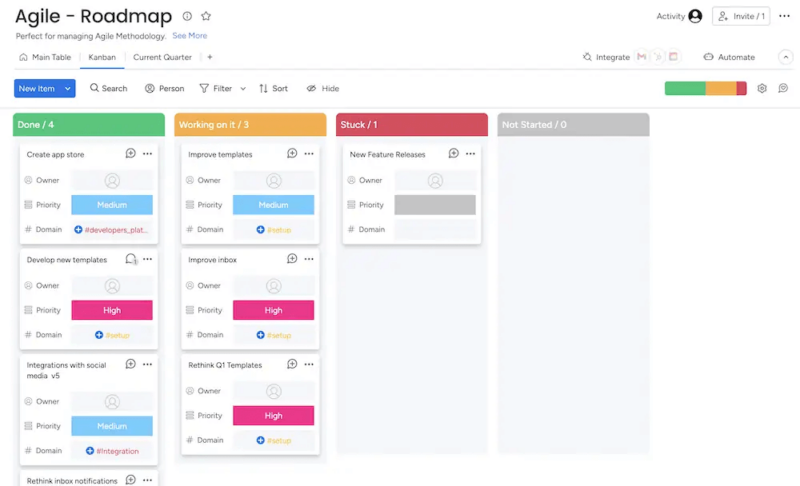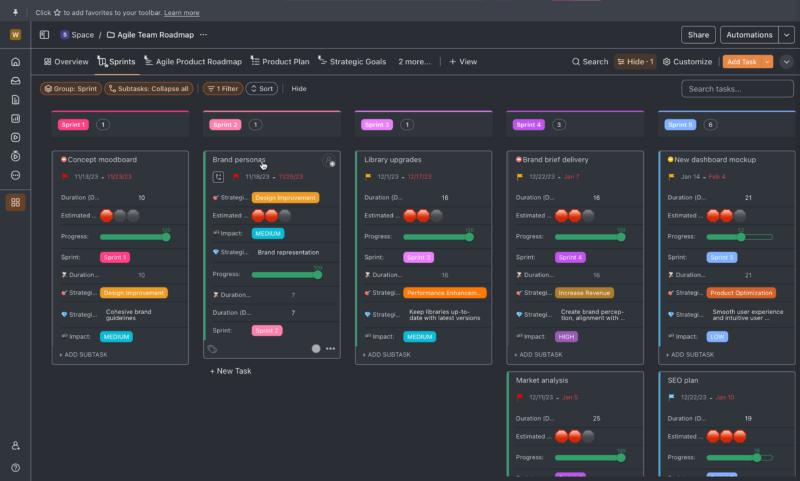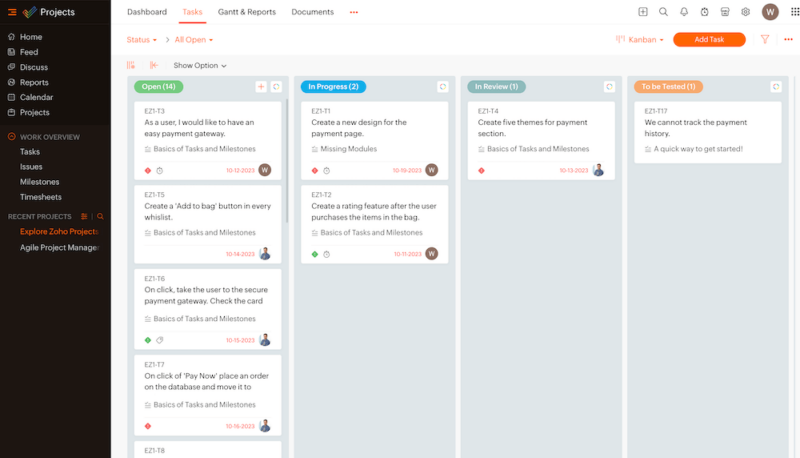Project management has grown in popularity. The Project Management Institute (PMI) estimates that by 2030, the global economy will need 25 million new project management professionals.1 You might be wondering, is project management a good career? What do project managers do? What are some of the best project management tools? Discover the answers in this article.
Below, you will learn why project management is considered a good career choice. We’ll also delve into project managers’ responsibilities and career paths, and weigh the pros and cons of this dynamic field. Don’t forget to check out our best free project management software roundup to find a good, free option for managing projects. Let’s get started!
Are Project Managers in Demand?
Project management is a promising career choice. In the United States, employment for project managers is expected to grow by 6% between 2022 and 2032, which is faster than the average for all occupations.2 Additionally, a PMI survey from 2021 indicates that it is one of the top five areas business leaders would like to prioritize.1
With the high demand for project management skills, 2.3 million people will need to join this job market annually to bridge the talent gap.1 A large portion of this growth comes from industries like software development and publishing, where projects are becoming more complex. This undoubtedly drives the need for effective project management.
What Does a Project Manager Do?
Project managers are responsible for overseeing the planning, execution and completion of projects within an organization. They make sure that projects are completed on time and within budget, and that they meet the desired objectives. Let’s take a closer look at the day-to-day duties and responsibilities.
- Creating project plans: Project managers are in charge of creating project plans that outline the goals, tasks, timelines and budgets for a project. They also define the project’s scope and establish clear objectives for the team.
- Managing resources: Project managers must efficiently allocate and manage the various resources necessary for the successful completion of a project, such as equipment, materials and human resources. Time management is also crucial, as tasks must be completed by the deadlines.
- Communicating with stakeholders: Another important part of a project manager’s job is to keep stakeholders informed about the project’s progress, address any concerns and make sure that the project is on track to meet goals.
- Fostering collaboration: A project manager plays a key role in creating a collaborative work environment. This involves resolving conflicts, encouraging open communication among different team members and sharing new ideas or new strategies with the team.
- Monitoring progress: Project managers constantly track project progress, identify potential issues and make adjustments as needed, ultimately leading to project success. Read our monday.com review to learn more about an efficient project management solution.
- Problem-solving: A project manager needs to be a skilled problem solver who can identify and resolve any issues that may arise during the project life cycle. Conducting sprint reviews and sprint retrospectives is a key way for a project manager to stay up to date about challenges and address them promptly.

to success as a project manager, especially those working remotely.
Project Manager Career Path
Career opportunities for a project management professional can vary depending on the industry and organization they work in and their career goals. Typically, an individual starts in an entry-level position, moves up to a senior-level project manager role and then ascends to a director or executive position.
An entry-level project management role like that of a project coordinator involves assisting project managers with planning and executing projects. As they gain more experience and leadership skills, they can progress to becoming project managers responsible for leading small to medium-sized projects.
With continued growth and development, industry experts can advance to senior project manager roles, overseeing multiple projects with larger scopes. A significant step in this career path is attaining a project management director or executive-level position, which entails managing entire project portfolios and shaping organizational structures and strategies.
Do Project Managers Make Good Money?
Project managers can earn attractive salaries, reflecting the high demand for their skills and the importance of their role within organizations. According to the Project Management Institute’s (PMI) salary data survey, salary tends to increase as responsibility grows from the role of project manager to portfolio manager.4
Project managers in the United States earn a median annual salary of $120,000. Here are the median annual salaries by position, according to PMI:
- Project management specialist: Median salary in the US — $85,000 per year 4
- Project manager I: Median salary in the US — $85,000 per year 4
- Project manager II: Median salary in the US — $100,000 per year 4
- Project manager III: Median salary in the US — $120,000 per year 4
- Project management consultant: Median salary in the US — $120,000 per year 4
- Program manager: Median salary in the US — $134,000 per year 4
- Portfolio manager: Median salary in the US — $147,000 per year 4
- Director of project management/PMO: Median salary in the US — $158,500 per year 4
How Much Do Project Managers Make Outside the US?
Project management positions are also in high demand worldwide, with competitive salaries in many countries. Let’s take a look at the median annual salaries (converted to U.S. dollars) for project managers in the United Kingdom, Australia and Canada.4
| Median Salary for Project Management Careers in the UK | Median Salary for Project Management Careers in Australia | Median Salary for Project Management Careers in Canada |
|---|---|---|
| $87,993 per year | $103,789 per year | $73,761 per year |
Is Project Management a Good Career?
With its strong demand, impressive earning potential and diverse career opportunities, project management can be considered a highly attractive career choice. However, to decide whether this is the right career path for you, you should consider various factors and weigh the pros and cons.
Pros:
- High earning potential
- Growth in leadership roles
- High demand in various industries
- Development of transferable & soft skills
- Opportunity to work on high-impact projects
- Collaborative environment & team cooperation
Cons:
- Long work hours
- Potential for burnout
- Extensive responsibility
- High-stress environment
Project Management Career Challenges
The opportunity to work across different departments makes project management jobs highly versatile. However, this role is not without challenges. Up to 91% of project management professionals say their organizations face project management difficulties involving being shuffled between projects (45%), remote work (40%) and extended leave (34%).3

with overcoming obstacles in project management.
Why Is Project Management Important?
Project management is critical for organizations across a wide range of industries, from computer science and information technology to construction projects and finance. The right project management methodology ensures that projects are completed efficiently, on time and within budget to maintain a competitive edge in the market.
A project manager plays a vital role in aligning a project’s tasks with an organization’s goals. Their skills, such as planning, communication and management, are crucial for navigating the complexities of modern projects and contributing to business success. Read our project management guide to learn how to manage people and projects.

for efficient collaboration, task management and progress tracking.
The Best Project Management Certifications
Now that you have a better understanding of why studying project management is important, you should consider taking a project management course to further enhance your skills and knowledge in this field. Here are some of the best project management certifications:
Types of Jobs in Project Management
Project management professionals can find employment across a wide range of industries. Though a project manager’s job description may be similar across roles, the specific job titles and day-to-day tasks can vary depending on the industry. The following are examples of job titles in project management:
Why Project Management Is a Good Career: Reddit Perspectives
We provided you with some facts and statistics about the professional life of a project manager. To paint a full picture of this career, we scrolled through Reddit for insightful comments from individuals with firsthand experience in the field.
One user shared the advantage of the project manager role: “If you are working with self-motivated, knowledgeable employees who can help you define an executable project from the start, life can be pretty straightforward and the job satisfaction is high.”
Conversely, another user expressed a different perspective: “I suppose being a project manager is stressful. The pay is highly variable, and the cutthroat nature of project management feels like you’re constantly under threat because perfection is expected.”
Another user commented that the burnout rate is high and suggested switching positions, project types and companies to gain broad experience and discover which type of project management role you like the most.
Final Thoughts
From the growing demand across various industries like software development and finance to the diverse career paths and high earning potential, project management jobs appear promising and rewarding. On the flip side, these roles often come with high stress and a continuous need for learning and development.
To determine whether project management is the right career for you, it is important to clearly define your career goals. Ask yourself whether you enjoy working in a fast-paced environment, excel at managing multiple priorities and are proficient at mitigating risks. If you answered “yes” to all three, a career in project management may be an ideal fit for you.
What are some essential skills to excel as a project manager? Have you considered pursuing a new career in project management? What advice do you have for someone interested in becoming a project manager? Share with us in the comments section below. Thank you for reading!
FAQ: Project Management Careers
-
Yes, project management can be a rewarding career path, with high job demand, competitive salaries and diverse opportunities for professional growth and development.
-
Project management can be a challenging and stressful role. As many as 91% of project management professionals say their organizations face project management challenges involving being shuffled between projects (45%), remote work (40%) and extended leave (34%).[3]
-
Some common reasons why people may choose to leave a project management career include the high-stress environment, the demand for long work hours, the potential for burnout and the desire for a better work-life balance.
{“@context”:”https:\/\/schema.org”,”@type”:”FAQPage”,”mainEntity”:[{“@type”:”Question”,”name”:”Is a Project Management Career Worth It?”,”acceptedAnswer”:{“@type”:”Answer”,”text”:”
Yes, project management can be a rewarding career path, with high job demand, competitive salaries and diverse opportunities for professional growth and development.\n”}},{“@type”:”Question”,”name”:”Is Project Management in Demand?”,”acceptedAnswer”:{“@type”:”Answer”,”text”:”
Yes, the employment rate for project managers is expected to grow by 6% between 2022 and 2032.[2] Additionally, the global economy will need 25 million new professionals by 2030.[1]\n”}},{“@type”:”Question”,”name”:”Is a Project Manager\u2019s Job Difficult?”,”acceptedAnswer”:{“@type”:”Answer”,”text”:”
Project management can be a challenging and stressful role. As many as 91% of project management professionals say their organizations face project management challenges involving being shuffled between projects (45%), remote work (40%) and extended leave (34%).[3]\n”}},{“@type”:”Question”,”name”:”Why Do People Quit Being Project Managers?”,”acceptedAnswer”:{“@type”:”Answer”,”text”:”
Some common reasons why people may choose to leave a project management career include the high-stress environment, the demand for long work hours, the potential for burnout and the desire for a better work-life balance.\n”}}]}
Sources:
- Talent Gap: Ten-Year Employment Trends, Costs, and Global Implications — PMI
- Project Management Specialists : Occupational Outlook Handbook — U.S. Bureau of Labor Statistics
- Future of Work Management Report 2023 — Smartsheet
- Earning Power: Project Management Salary Survey — Thirteenth Edition
- Project Management Professional (PMP)® Certification — PMI
The post Is Project Management a Good Career? Job Types, Paths and Salary in 2024 appeared first on Cloudwards.




